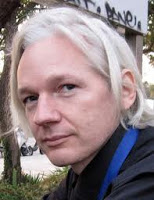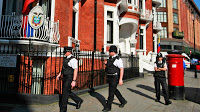Law and Rights
 It is reported (e.g. Guardian 20th June) that Mr Julian Assange has entered the Embassy of Ecuador .
It is reported (e.g. Guardian 20th June) that Mr Julian Assange has entered the Embassy of Ecuador .
Another article (BBC 20th June - Wikileaks founder Julian Assange faces arrest, police say ) comments: - "Our correspondent said that, as Mr Assange had broken the condition of his bail that he lived at a friend's house in Norfolk, a criminal offence had been committed."
It will be recalled that District Judge Riddle refused Assange bail but that it was later granted by Mr Justice Ouseley.
Persons granted bail are expected to abide by any conditions attached to that bail. Common conditions include a requirement to live and sleep at a specified place; to report to the Police at a specified police station at specified times and so on. Sometimes sureties come forward. Also, sometimes, securities are taken.
A "surety" is a person who agrees that a sum
of money (in whole or in part) may be forfeited if another person fails to surrender to custody as required.
A security is money paid into court before the defendant is allowed out on bail.
I do not have the precise details of Mr Assange's bail though a number of sureties came forward in support of Mr Assange and it also appears that he was required to be at an address between certain times of the night. Until he went to the embassy, it can be safely assumed that he adhered to whatever his conditions were.
It is NOT a criminal offence to fail to abide by a bail condition but the Police are entitled to arrest the individual who must then be produced in court. The court may then decide whether to revoke bail or to allow it to continue on the same or other conditions.
Embassies / Diplomatic Missions:
One slight problem here however. An embassy is inviolate - Article 22 of the Vienna Convention on Diplomatic Relations:
The Vienna Convention has effect in English law because of the Diplomatic Privileges Act 1964
As I understand this, Mr Assange cannot be arrested whilst he is under the protection of the Ecuador Embassy unless, of course, the Ambassador permits entry to the embassy.
See the Ecuadorian Embassy statement about Assange
"As a signatory to the United Nations Universal Declaration for Human Rights, with an obligation to review all applications for asylum, we have immediately passed his application on to the relevant department in Quito.
While the department assesses Mr Assange?s application, Mr Assange will remain at the embassy, under the protection of the Ecuadorian Government.
The decision to consider Mr Assange?s application for protective asylum should in no way be interpreted as the Government of Ecuador interfering in the judicial processes of either the United Kingdom or Sweden."
Those with lengthy memories will recall the shooting of PC Yvonne Fletcher in London on 17th April 1984. She was shot by someone from within the Libyan Embassy. Whilst the Police surrounded the embassy for several days afterwards, the British government eventually allowed the Libyan personnel to depart and then severed diplomatic relations with Libya. British public opinion was angry and would undoubtedly have favoured the Police entering the embassy with a view to searching for weapons etc. and, interestingly, Lord Denning spoke * in Parliament about it:
"All I would say is that, as I view this Vienna Convention, and as I view the Diplomatic Privileges Act, they did not give privilege to those criminals who were shooting from the embassy in St. James's Square."
Earlier this year, the Libyan Prime Minister laid a wreath at the site where PC Fletcher was killed.
Addendum 1: Readers may wish to see Francis Fitzgibbon QC's Nothing like the Sun blog - "Julian the asylum seeker"
Ecuadorian Ambassador
Addendum 2: See Head of Legal blog 26th June - "Julian Assange: can he get out of this?"
* Lord Denning - High Court Judge 1944 - Master of the Rolls from 1962 to 1982.
- An Interesting Question - What If Mr Assange Ever Got To Sweden?
Recommended reading: A post on the Pal Wrange blog is well worth reading on this subject and offers a similar view to that in my post below and also looks at whether Assange could now be extradited from the UK directly to the USA. --- Julian Assange...
- Assange: Jaw Jaw
Updates: Assange spoke from the Embassy on Sunday 19th August - see BBC. The Head of Legal blog has considered some aspects of this. A good article from Scotland is that by advocate Niall McCluskey - "Assange - what's going...
- Assange: Supreme Court Decision
This morning the Supreme Court ruled that the request by the Swedish prosecutor for the extradition of Mr Julian Assange was lawfully made - see Judgment and Press release. For the purposes of the European Framework Decision creating the European...
- Julian Assange And Bail
As of this morning, Mr Julian Assange remains detained in prison - The Guardian 15th December. He was granted conditional bail on Tuesday 14th December but there is to be an appeal against that decision to the High Court. It always seemed...
- How The Eu Continues To Expand Its Influence Over Criminal Matters
Mr Assange (founder of Wikileaks) has been arrested under a European Arrest Warrant (EAW) issued by Sweden - see BBC 8th December 2010. The EAW refers to sexual offences alleged to have been committed in Sweden. Mr Assange was refused bail...
Law and Rights
Assange ~ Breach of Bail ~ Status of Embassies

Another article (BBC 20th June - Wikileaks founder Julian Assange faces arrest, police say ) comments: - "Our correspondent said that, as Mr Assange had broken the condition of his bail that he lived at a friend's house in Norfolk, a criminal offence had been committed."
It will be recalled that District Judge Riddle refused Assange bail but that it was later granted by Mr Justice Ouseley.
General points about bail:
Persons granted bail are expected to abide by any conditions attached to that bail. Common conditions include a requirement to live and sleep at a specified place; to report to the Police at a specified police station at specified times and so on. Sometimes sureties come forward. Also, sometimes, securities are taken.
A "surety" is a person who agrees that a sum
of money (in whole or in part) may be forfeited if another person fails to surrender to custody as required.
A security is money paid into court before the defendant is allowed out on bail.
I do not have the precise details of Mr Assange's bail though a number of sureties came forward in support of Mr Assange and it also appears that he was required to be at an address between certain times of the night. Until he went to the embassy, it can be safely assumed that he adhered to whatever his conditions were.
It is NOT a criminal offence to fail to abide by a bail condition but the Police are entitled to arrest the individual who must then be produced in court. The court may then decide whether to revoke bail or to allow it to continue on the same or other conditions.
 |
| Ecuador - London Embassy |
One slight problem here however. An embassy is inviolate - Article 22 of the Vienna Convention on Diplomatic Relations:
1.The premises of the mission shall be inviolable. The agents of the receiving State may not enter
them, except with the consent of the head of the mission.
2.The receiving State is under a special duty to take all appropriate steps to protect the premises
of the mission against any intrusion or damage and to prevent any disturbance of the peace of the
mission or impairment of its dignity.
3.The premises of the mission, their furnishings and other property thereon and the means of
transport of the mission shall be immune from search, requisition, attachment or execution.
The Vienna Convention has effect in English law because of the Diplomatic Privileges Act 1964
As I understand this, Mr Assange cannot be arrested whilst he is under the protection of the Ecuador Embassy unless, of course, the Ambassador permits entry to the embassy.
See the Ecuadorian Embassy statement about Assange
"As a signatory to the United Nations Universal Declaration for Human Rights, with an obligation to review all applications for asylum, we have immediately passed his application on to the relevant department in Quito.
While the department assesses Mr Assange?s application, Mr Assange will remain at the embassy, under the protection of the Ecuadorian Government.
The decision to consider Mr Assange?s application for protective asylum should in no way be interpreted as the Government of Ecuador interfering in the judicial processes of either the United Kingdom or Sweden."
Those with lengthy memories will recall the shooting of PC Yvonne Fletcher in London on 17th April 1984. She was shot by someone from within the Libyan Embassy. Whilst the Police surrounded the embassy for several days afterwards, the British government eventually allowed the Libyan personnel to depart and then severed diplomatic relations with Libya. British public opinion was angry and would undoubtedly have favoured the Police entering the embassy with a view to searching for weapons etc. and, interestingly, Lord Denning spoke * in Parliament about it:
"All I would say is that, as I view this Vienna Convention, and as I view the Diplomatic Privileges Act, they did not give privilege to those criminals who were shooting from the embassy in St. James's Square."
Earlier this year, the Libyan Prime Minister laid a wreath at the site where PC Fletcher was killed.
Addendum 1: Readers may wish to see Francis Fitzgibbon QC's Nothing like the Sun blog - "Julian the asylum seeker"
Ecuadorian Ambassador
Addendum 2: See Head of Legal blog 26th June - "Julian Assange: can he get out of this?"
Footnote:
* Lord Denning - High Court Judge 1944 - Master of the Rolls from 1962 to 1982.
- An Interesting Question - What If Mr Assange Ever Got To Sweden?
Recommended reading: A post on the Pal Wrange blog is well worth reading on this subject and offers a similar view to that in my post below and also looks at whether Assange could now be extradited from the UK directly to the USA. --- Julian Assange...
- Assange: Jaw Jaw
Updates: Assange spoke from the Embassy on Sunday 19th August - see BBC. The Head of Legal blog has considered some aspects of this. A good article from Scotland is that by advocate Niall McCluskey - "Assange - what's going...
- Assange: Supreme Court Decision
This morning the Supreme Court ruled that the request by the Swedish prosecutor for the extradition of Mr Julian Assange was lawfully made - see Judgment and Press release. For the purposes of the European Framework Decision creating the European...
- Julian Assange And Bail
As of this morning, Mr Julian Assange remains detained in prison - The Guardian 15th December. He was granted conditional bail on Tuesday 14th December but there is to be an appeal against that decision to the High Court. It always seemed...
- How The Eu Continues To Expand Its Influence Over Criminal Matters
Mr Assange (founder of Wikileaks) has been arrested under a European Arrest Warrant (EAW) issued by Sweden - see BBC 8th December 2010. The EAW refers to sexual offences alleged to have been committed in Sweden. Mr Assange was refused bail...
